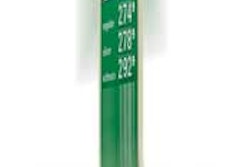You just can’t have one without the other. If you want to improve cash flow and cash management, you need to control the bidding, billing and collection process. To control the bidding, billing and collection process, you need a system in place that you follow religiously, and competent, detail-oriented accounting help. An industry-oriented accounting package helps, as well.
Meeting all the conditions mentioned above can be tough, but it is do--able by every contractor, no matter how big or small. Performing at less than the standards outlined spells trouble and, hence, cash flow problems. This hurts smaller contractors the most. In other words, it pays to find out how to run your business and what processes to follow if you hope to make reasonable profits. To do less increases your risk of failure tenfold.
Create an efficient accounting system
Having a system in place is really the key to proper bidding, job management, expense accounting, billing and collection. The process should be seamless, with the right accounting software in place and administrative staff with a basic knowledge of the contracting business. Daily checklists should be in place for review by the owner or manager to see that all steps to properly account for billable work have been compiled. Keeping up with the daily accounting should be a standard job requirement and it should be reviewed daily by management. Repeated failures to comply with this standard should be grounds to replace the field and administrative personnel with other people.
With the “daily” requirements met, it is an easy process to proceed to the billing function, compare it to the bid documents, prepare an invoice, have it approved and mail it out once or twice per month. Sounds too easy, doesn’t it? Well, it can be if you keep up with the daily paperwork and know that it is complete and reasonable.
Some of you think you cannot afford to run your business this way. Yes, you can, and yes, you must. The alternative is much more costly. Can you possibly know what or how you are doing without having complete, timely, prepared job cost records to review before a job gets out of hand? What you save by having better control of your business more than offsets the costs associated with having and keeping better accounting and business records.
Keeping records current has another benefit, as well; it helps with the bidding process. Knowing your costs are properly allocated to a job makes it a lot easier to be competitive on the next bid for similar types of work.
Wouldn’t it be nice to bid the next opportunity knowing you have a good chance of getting the job and actually making a buck in the process? It sure beats the alternative.
Every size contractor has the opportunity and ability to run their business in this manner. In its simplest form, this system requires:
a policy to bill each job as soon as possible under the terms of the contract;
a collection policy to keep balances outstanding to a reasonable amount.
If you are lacking any of these functions, adjustments are required immediately. Many of these functions can be brought into proper guidelines by finding detail--oriented people to do the work for you.
For many of you, these would be part--time people who are available if you put the word out explaining what you need. For part-time office contractors, you can expect to pay $15 to $30 per hour. At $30, that person should be able to put it all together for you on a timely basis each month. That doesn’t mean the $30 person is doing all the work, but the employee is managing the entire process and is hiring the $15 people as needed.
If your records are not completed in a timely manner, you either do not have enough people, or the people doing the work are not qualified. Inquiries of other similar--size contractors should give you a hint of how many people you should have and how often.
Get the bills out
Completing the accounting cycle on time is great, but it does you little good unless you convert the billing to cash. Taking on the right jobs, doing proper credit checks and making sure proper bonds are in place help to limit bad debts. Aside from bad debts, however, you still have the balance of receivables to collect.
Getting the billing out as soon as possible speeds up the collection process. Keeping on the customers with a consistent collection policy makes the difference between having and not having adequate cash to manage the business. Again, using part--time people to collect money proves to more than pay for itself. A detailed person who has collection experience keeps good notes and can review their weekly activity by account. He or she keeps up a consistent message, which is the way to go. It really works.
Notice the one theme throughout this month’s column.
The contractor is only asked to do a daily review of the system and collection process and not to do the actual work. The use of part--time personnel is the way to maximize both billing and cash flow. Pay these people enough and they will earn their keep and stay with you even if you have to cut their hours in the off season. Managing receivables is not tough -- as long as you take care of the details beforehand.


















